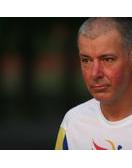As an ultra runner, you place an extraordinary amount of strain on your muscles and tendons. An unfortunate byproduct of this is injury – particular overuse injury. Despite this, there are ways that runners can minimize the risk of injury. One of these methods is self-massage and myofascial release. I am going to detail some of the most time efficient and effective methods of releasing and relieving areas prone to tightness or soreness in ultra athletes.
To perform these techniques, you need a firm ball and a thick book or small hard box. I have used the RAD Roller, RAD Rounds and RAD Block here, which I find to be effective because they are the perfect size/shape and are versatile. However, there are many objects around the home that can also be used.
Plantar fascia/foot arch
Your feet are first in line when it comes to ground impact. I have found that foot soreness is a problem that comes on quite rapidly, meaning that it is important to be proactive by utilizing pre-competition, post-competition and maintenance massage.
The Plantar Fascia is a fibrous band that runs along the bottom of your feet. To release this area of your foot, use a tennis ball or similar self-massage tool. Begin by positioning the ball where the hard part of your heel ends and the softer part of your foot begins. Roll the ball along your foot until you reach the ball of your foot. Roll the ball back and forward, with a particular focus on the area just in front of the heel.
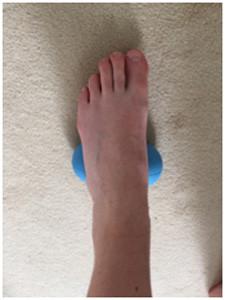
Roll the ball along the base of your foot (pictured here using RAD Roller)
As ultra runners often compete on uneven terrain, the small stabilizing muscles around the ankle can place strain on the arch of the foot, causing soreness or fatigue. For effective self-massage of the foot arch, place a small ball (golf-ball size) on the inside of your foot, just where the hard part of the heel ends. To massage, roll the ball side to side on this particular area. Move the ball forward slightly after about 10 side to side rolls. Move along the arch and focus on areas that are particularly fatigued.
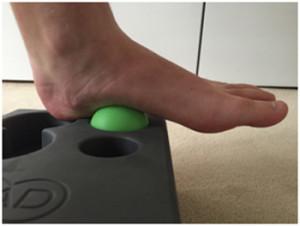
Position the ball on the inside of your foot, just in front of the heel (pictured here using RAD Rounds and RAD Block)
Soleus/Gastrocnemius (calf muscles)
A common area of fatigue in all runners is in the calf region – particularly the gastrocnemius and soleus muscles. To release the muscles of the calf, find a raised surface (such as a hard box) and a firm ball. Place the ball underneath the calf, just where the bulge of the calf finishes. Once the ball is in position, rotate your foot in a circle 5 times in one direction and then 5 times in another direction. Once you feel as though the calf has released, move the ball up or down your calf depending on where you feel most tight or fatigued.
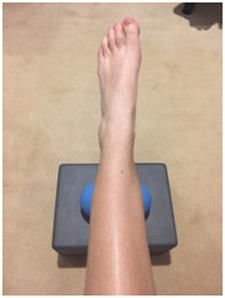
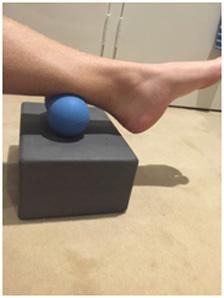
Hamstrings
Self-massage of the hamstrings is difficult without the help of a professional sports masseur. Despite this, there exists a highly effective way to self-massage the hamstring muscles. To perform this technique, you need a hard ball about the size of a tennis ball. Once you have this, sit over the edge of a hard table or chair. Place the ball underneath the hamstrings and perform small forward kicks whilst the ball rolls around your hamstring. Once you feel as though a particular area has released, you can then move the ball to another area of the hamstring.
If you perform these techniques as a matter of maintenance – it will go a long way towards a healthy ultra running career.
About Georgie Meehan
Georgie is a competitive distance runner from Australia. She enjoys competing in races ranging from 800m – 10km. She has also been injured like many other runners and wants to help others keep their running limbs healthy.
